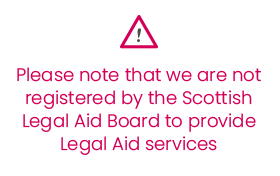Divorce for Business Owners in Glasgow, Scotland
Relationship and family breakdown can be both distressing and complicated. In any divorce, the division of assets of the parties can be problematic. This can be particularly so for business owners because of the need to put a value on those business interests as part of the financial settlement in a divorce.
Financial Provision
Under Scots law, the division of matrimonial property should be “shared fairly” between both parties. With some exceptions, this means all property or assets acquired by the couple during the marriage and before separation be divided between them. The general approach by the court is to allow a “clean break” settlement by the award of a capital sum. The assets of a business owned by one or both of the parties will be part of this calculation.
What happens to business assets in a divorce?
As with the general principle, business interests will normally be taken into account as matrimonial property if they were set up or acquired after marriage.
Where the business was built up or acquired before the marriage and nothing has changed to the ownership or structure of the business, it would not usually be included in the calculation of matrimonial property. However, any increase in the value of a pre-existing business might be included, but the rules are complicated.
If the business is to be included in the matrimonial property then an accountant would normally be instructed in order to value the business, yet different methodologies can be used and disputes over the valuation can occur. Start-ups, where a business has prospects but may not make a profit for some time, can be particularly difficult to value.
Following the clean break principle, a business owner may retain control of a business so long as the spouse’s assets amount to the same value. Generally, the courts do not wish to damage a business so would be reluctant to give a share to a spouse who had no day-to-day involvement in the running of the company or if an instruction to sell part of the business put its future at risk.
More problematic still is when the business is owned and managed by a husband and wife team. Each may have specific roles and either one leaving could devalue the business. In such a situation, who should own the ongoing business as part of the divorce settlement can take some time to determine, especially in acrimonious circumstances.
Contact our Specialist Divorce Solicitors Glasgow, Scotland
At Miller Samuel Hill Brown, we will discuss with you your particular circumstances with discretion and understanding before exploring the best options for you. We will provide clear, expert advice on all aspects of your divorce, including the added complexities for business owners. Based in Glasgow City Centre, our divorce lawyers also help clients in Glasgow’s West End, South Side, Paisley and across Renfrewshire, Lanarkshire and Central Scotland. Please contact our divorce and dissolution specialists via our online contact form














